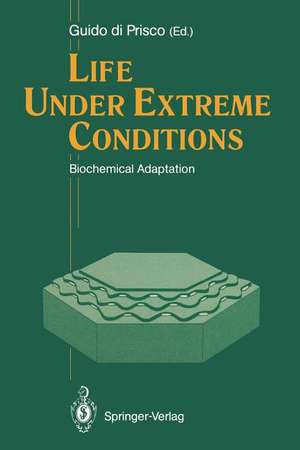Life Under Extreme Conditions: Biochemical Adaptation
Editat de Guido di Priscoen Limba Engleză Paperback – 7 dec 2011
Preț: 633.68 lei
Preț vechi: 745.50 lei
-15% Nou
Puncte Express: 951
Preț estimativ în valută:
121.26€ • 126.92$ • 100.92£
121.26€ • 126.92$ • 100.92£
Carte tipărită la comandă
Livrare economică 31 martie-14 aprilie
Preluare comenzi: 021 569.72.76
Specificații
ISBN-13: 9783642760587
ISBN-10: 3642760589
Pagini: 160
Ilustrații: XI, 144 p. 4 illus.
Dimensiuni: 155 x 235 x 8 mm
Greutate: 0.23 kg
Ediția:Softcover reprint of the original 1st ed. 1991
Editura: Springer Berlin, Heidelberg
Colecția Springer
Locul publicării:Berlin, Heidelberg, Germany
ISBN-10: 3642760589
Pagini: 160
Ilustrații: XI, 144 p. 4 illus.
Dimensiuni: 155 x 235 x 8 mm
Greutate: 0.23 kg
Ediția:Softcover reprint of the original 1st ed. 1991
Editura: Springer Berlin, Heidelberg
Colecția Springer
Locul publicării:Berlin, Heidelberg, Germany
Public țintă
ResearchDescriere
In their very first lecture biochemists learn that biomolecules, namely nucleic acids, proteins and lipids, are extremely temperature sensitive and will denature and lose their function easily. Then how do Archaebacteria survive in hot springs or Antarctic fishes which live in ice-cold water? The way nature engineered subcellular structures, lipid membranes or proteins to meet the biochemical requirements of extreme conditions - like extreme temperature or salt concentrations - is described in Life Under Extreme Conditions.
Cuprins
The Role of Antifreeze Glycopeptides and Peptides in the Freezing Avoidance of Cold-Water Fish.- An Overview of the Molecular Structure and Functional Properties of the Hemoglobins of a Cold-Adapted Antarctic Teleost.- Cold-Stable Microtubules from Antarctic Fish.- Life in Arctic Environments: Molecular Adaptation of Oxygen-Carrying Proteins.- Archaebacteria: Lipids, Membrane Structures, and Adaptation to Environmental Stresses.- How Nature Engineers Protein (Thermo)Stability.- Enzymes from Extreme Thermophilic Bacteria as Special Catalysts: Studies on a ?-Galactosidase from Sulfolobus solfataricus.- A Model for the Stabilization of a Halophilic Protein.















